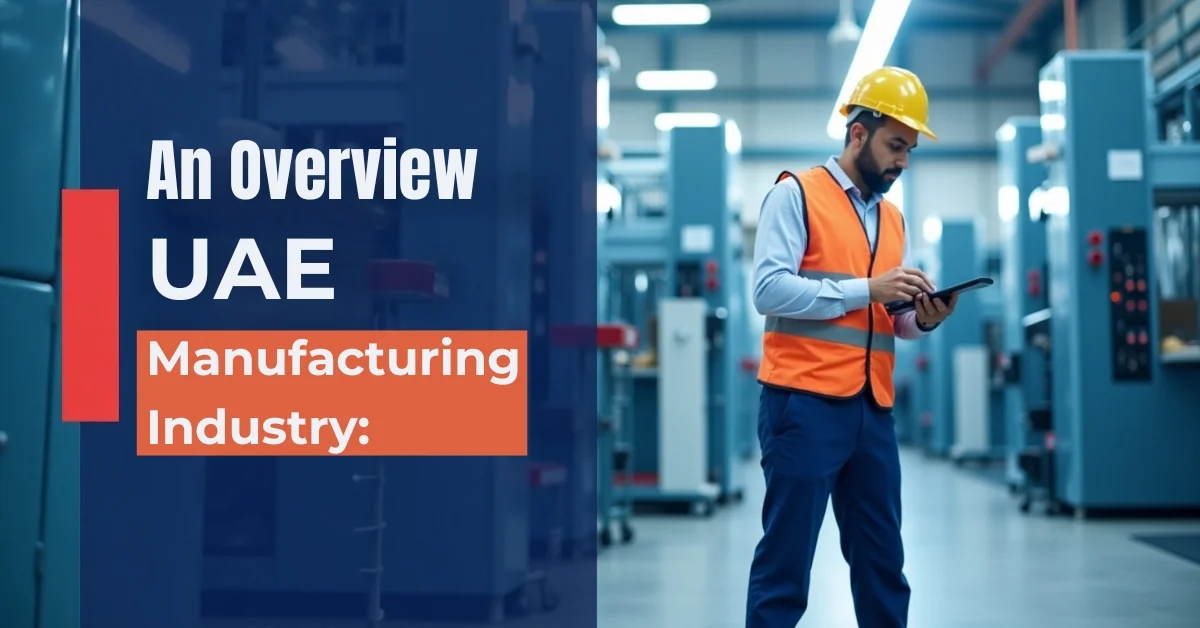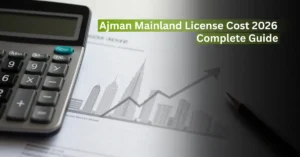Introduction
The UAE manufacturing industry has become one of the strongest pillars of the country’s economic growth. Known for its oil and trade dominance in the past, the UAE is now actively diversifying into industrial production, innovation, and technology-driven manufacturing.
This shift supports the UAE’s goal of reducing oil dependency while building a sustainable, knowledge-based economy. For investors, policymakers, and entrepreneurs, the manufacturing sector presents enormous opportunities across multiple industries. In this blog, we explore the major sectors, government initiatives, infrastructure, challenges, and future opportunities shaping the UAE manufacturing industry.
Key Sectors Driving Manufacturing Growth in UAE
The manufacturing sectors in UAE are diverse and supported by strong infrastructure, advanced technology, and strategic trade policies. Let’s take a closer look at the main industries.
1. Petrochemicals, Chemicals & Plastics
- The petrochemical industry remains one of the largest contributors to the UAE’s manufacturing output.
- It supplies essential raw materials such as plastics, fertilizers, and chemicals for global industries.
- The UAE exports petrochemical products to Asia, Europe, and Africa, strengthening its role in global supply chains.
2. Metals & Aluminium
- The UAE is among the world’s top aluminum producers, with Emirates Global Aluminium (EGA) being a leading player.
- Aluminum exports contribute significantly to non-oil trade and support industries like automotive, aerospace, and construction.
- Steel and metal fabrication industries also serve the booming infrastructure and real estate markets.
3. Food and Beverage Manufacturing
- With food security being a national priority, the food and beverage industry in UAE is expanding rapidly.
- Local production reduces import dependency and supports the growing population.
- Investments in dairy, packaged foods, and beverages are attracting global brands to set up operations in the Emirates.
4. Rubber, Packaging & Other Goods
- The packaging industry is growing in line with e-commerce, retail, and consumer demand.
- Rubber and plastic products serve both industrial and household markets.
- These supporting industries play a crucial role in enabling other manufacturing operations to thrive.
Economic Contributions & Strategic Initiatives
The manufacturing impact on UAE economy is significant, with continuous growth supported by visionary strategies.
- Contribution to GDP: Manufacturing accounts for over 9% of the UAE’s GDP and is expected to grow further under new initiatives.
- Non-oil diversification: Industrial exports are central to diversifying beyond hydrocarbons.
- Strategic Programs:
- Operation 300Bn: A national industrial strategy to raise the manufacturing sector’s contribution to AED 300 billion by 2031.
- Incentives: Low-cost financing, land lease discounts, and technology adoption support.
- Role of SMEs & Free Zones: Small and medium-sized manufacturers benefit from simplified licensing in zones like JAFZA, KIZAD, and Dubai Industrial City.
Infrastructure, Logistics & Regulatory Environment
The UAE offers world-class infrastructure and logistics that make it one of the most attractive destinations for manufacturers.
- Industrial & Free Zones: Zones like Dubai Industrial City, Khalifa Industrial Zone Abu Dhabi (KIZAD), and Sharjah’s Hamriyah Free Zone provide ready-made facilities, tax benefits, and global connectivity.
- Utilities & Energy: Stable electricity and water supply, plus investments in renewable energy, support sustainable manufacturing.
- Transport & Logistics: Advanced ports like Jebel Ali and airports in Dubai and Abu Dhabi provide seamless global supply chain access.
- Regulatory Frameworks: Licensing processes are streamlined, and strict environmental standards encourage eco-friendly operations.
Challenges Facing the UAE Manufacturing Industry
Despite its growth, the UAE manufacturing industry faces several challenges that businesses must navigate.
- High Operating Costs: Energy and labor costs are higher compared to some regional competitors.
- Global Competition: Manufacturers must compete with lower-cost hubs like India, China, and Vietnam.
- Skills Gap: Demand for highly skilled engineers, technicians, and managers sometimes exceeds local availability.
- Sustainability Pressure: Environmental regulations and the push for green manufacturing require significant investments in new technologies.
Trends & Opportunities Ahead
The future of manufacturing in UAE looks promising, driven by innovation, sustainability, and global partnerships.
- Automation & Industry 4.0: Factories are adopting robotics, AI, and IoT to increase efficiency.
- Green Manufacturing: Focus on renewable energy, eco-friendly production, and carbon reduction.
- Localization & Supply Chain Resilience: Encouraging local production to reduce reliance on imports.
- Global Trade Expansion: Strategic location makes the UAE a hub for exports to Asia, Africa, and Europe.
How to Start or Expand in UAE Manufacturing
Starting a factory or industrial business in the UAE is straightforward but requires careful planning.
- Steps to Begin:
- Choose a business activity and company structure.
- Register the trade name and apply for initial approvals.
- Obtain a manufacturing license in the UAE.
- Documents Needed:
- Passport copies of shareholders.
- Business plan and feasibility report.
- Industrial project approval from authorities.
- Cost Considerations: Licensing fees, facility rental, equipment investment, and utilities.
- Choosing Location:
- Mainland: Allows local and GCC trade with fewer restrictions.
- Free Zone: Provides 100% foreign ownership, tax benefits, and easier setup.
Case Studies or Success Stories
Several manufacturing companies in the UAE showcase how the industry is growing.
- Emirates Global Aluminium (EGA): Supplies aluminum globally, ranking as a top producer.
- Al Ghurair Foods: A major player in the food industry, producing flour, pasta, and edible oils.
- Borouge: A leading petrochemical company exporting plastic solutions worldwide.
Lessons Learned:
- Strong government backing supports growth.
- Strategic location ensures export success.
- Innovation and scale drive global competitiveness.
UAE vs Other Manufacturing Hubs
| Cost of labor/utilities | UAE | India / Saudi Arabia / Turkey |
| Ease of licensing/regulation | Higher | Lower |
| Logistics/transport efficiency | Streamlined in free zones | Moderate to complex |
| Market access/exports | World-class ports & airports | Developing infrastructure |
| Access to Asia, Africa, and Europe | Access to Asia, Africa, Europe | Focused on regional markets |
FAQ
Q1: What is the cheapest emirate to manufacture in in the UAE?
Sharjah and Ajman are generally more cost-effective compared to Dubai and Abu Dhabi.
Q2: What is the expected growth of the UAE manufacturing industry by 2028?
Analysts expect steady growth, with manufacturing contributing up to 15% of GDP by 2030.
Q3: Can foreign investors own 100% of a manufacturing company in the UAE?
Yes, especially in free zones where 100% foreign ownership is permitted.
Q4: What is the role of SMEs in UAE manufacturing?
SMEs drive innovation, create jobs, and support supply chain resilience in multiple industries.
Conclusion
The UAE manufacturing industry is at the heart of the country’s transition into a diversified, future-ready economy. With strategic initiatives like Operation 300Bn, state-of-the-art infrastructure, and a favorable business climate, the sector continues to attract global investors.
While challenges such as high costs and global competition remain, the UAE’s strong focus on innovation, sustainability, and trade resilience ensures long-term growth. For entrepreneurs, investors, and businesses, this is the right time to explore opportunities in the manufacturing industry in the UAE.






